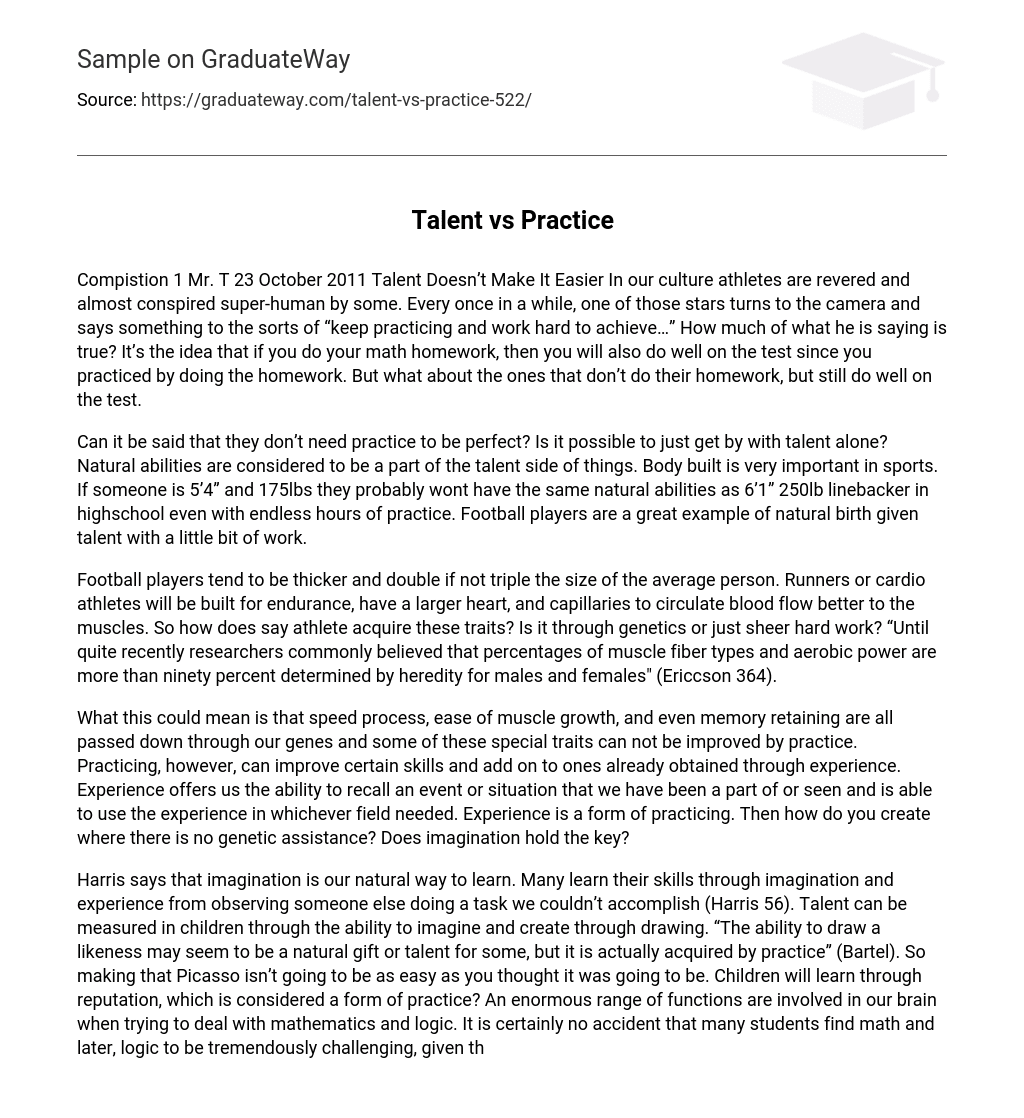Within our society, athletes hold a position of great admiration and are sometimes even regarded as being almost superhuman. On occasion, these exceptional individuals will address the camera, urging others to persistently practice and exert effort in order to attain success. However, it is uncertain how much truth lies in their words. This notion can be likened to the belief that achieving success on a test is guaranteed if one diligently completes their math homework due to the practice involved. Nevertheless, there are also situations where individuals excel on tests despite not having completed their homework.
Can perfection be attained without practice or is talent enough on its own? Talent refers to natural abilities, and in sports, an individual’s physique plays a significant role. For example, a person who is 5’4″ and weighs 175lbs may not possess the same innate abilities as a high school linebacker who is 6’1″ and weighs 250lbs, even if they both dedicate numerous hours to practice. Football players embody the combination of natural talent and some level of effort.
Football players typically have a larger size compared to the average person, sometimes even being double or triple in size. On the other hand, runners or athletes involved in cardio activities are focused on developing endurance, boasting a larger heart and more efficient capillaries to improve blood flow to the muscles. Thus, the question arises regarding how athletes acquire these traits: is it purely due to genetics or a result of their hard work? According to Ericcson (364), it was a common belief among researchers until recently that muscle fiber types and aerobic power were predominantly influenced by heredity in both males and females.
It is possible that certain qualities like speed process, ease of muscle growth, and memory retention are inherited through our genes. Some of these unique traits cannot be enhanced through practice. However, practicing can improve specific skills and build upon existing ones acquired through experience. Experience allows us to remember and utilize past events or situations in various fields. In a way, experience is a form of practice. But how do we develop abilities that are not genetically determined? Could imagination be the answer?
Harris (56) argues that imagination is an essential part of our learning process. Many people acquire skills by using their imagination and observing others perform tasks that may initially seem impossible. Bartel states that children’s ability to imagine and create through drawing is a sign of their talent, but it should be noted that the skill of drawing accurately can be developed with practice.
Making Picasso won’t be as easy as you thought it would be. Children learn through reputation, which is a form of practice. Our brain performs various functions to handle mathematics and logic, so it’s not surprising that many students find these subjects challenging. They require a significant amount of brain energy even for simple problems (Gurian 51). Therefore, repetition is necessary until it becomes second nature. However, it’s illogical to claim that practicing is required to learn a subject if you possess the talent to compute information effortlessly.
Math can be divided into a talent aspect. Some people have a natural ease with numbers, while others struggle even with extensive studying. Many students dislike repeating or practicing school work (including me). Ignoring homework and extra practice often leads to procrastination among students. Procrastination can be considered as a talent according to the Oxford Dictionary, defined as the act of delaying or postponing something (procrastinate). Approximately twenty-five percent of people confess to procrastinating.
The top regret identified by adults is not dedicating enough time to their education (Kasland). Practice plays a crucial role in achieving success, surpassing talent alone. Research indicates that combining hard work with talent can lead to becoming a Picasso or having a higher vertical jump. Even if it involves disliked tasks such as homework or executing a crucial play on the football field, natural abilities tend to improve with practice.





